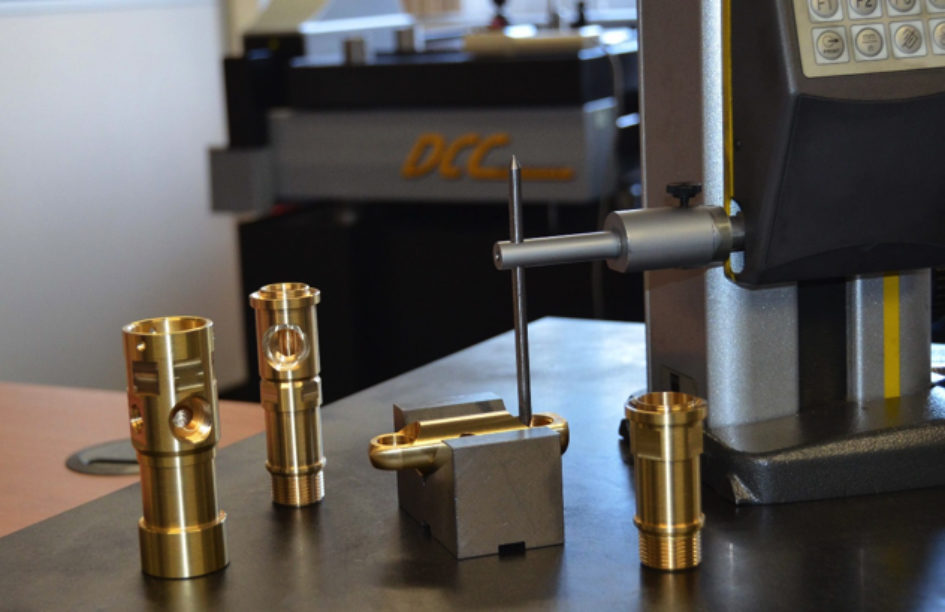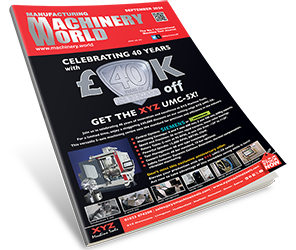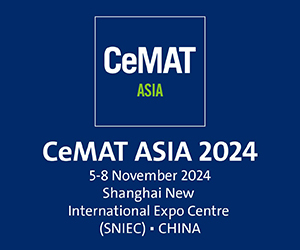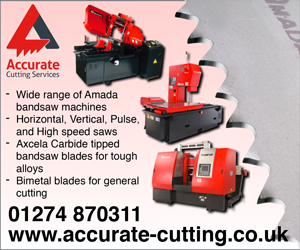What comes first, the chicken or the egg? Does a company invest to build the business then push to achieve quality supply, or instigate the breeding of quality standards from the outset and use this as the platform from which everything is undertaken for long term planned growth?
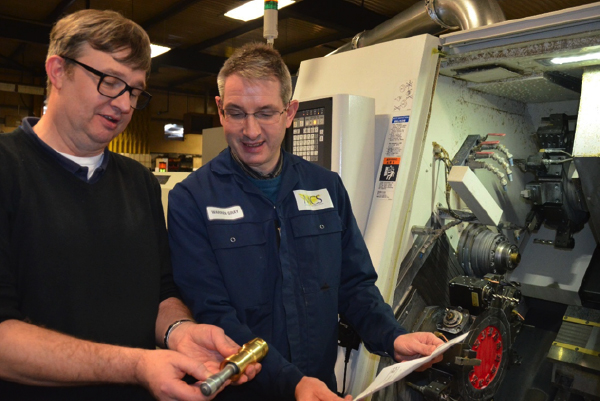
Warren Gray, Managing Director (right) and Andrew Lambert (left) take quality issues very seriously at MCS
This dilemma was overcome by Warren Gray when he took over the day- to-day running of his father’s subcontract machinist company Machined Component Systems (MCS) when ‘Quality First’ was his, without question, the door-to-door regime. Indeed, this decision has paid-off with the recent renewal of a long term contract to supply 22 different water pump components which will help take the turnover from £2.5 to £3 million for the 36 people business and initiated the investment in the latest Miyano BNE-51MSY turn-mill centre.
Said Mr Gray: “It’s our view that quality should never be an issue for debate in production and we also strictly apply it to procedures involving our suppliers as well.” He outlines as a prime example the most recent installation of the Citizen Machinery UK supplied Miyano BNE-51MSY in the machine shop which has 30 CNC machines in Redditch. Here, the extensive selection procedure involving a turnkey application based proposal followed by full acceptance trials has resulted in a highly successful installation that has proven to maintain consistent production through both day and unmanned night shifts.
Production Manager Andrew Lambert was heavily involved, drawing on his previous plant purchase procedure experience in an automotive supplier group. Although nine Miyano fixed head and one Citizen CNC sliding head turn-mill centres are installed alongside other CNC machines, Mr Lambert went out on initial enquiry for turn-mill bar machines up to 50 mm capacity able to fully exploit combined operations on the family of brass water pump components.
Said Mr Lambert: “With the confidence of a long term contract, price becomes secondary to productivity, so we based our decision on ‘efficiency-to-perform’, reliability and the level of application engineering involved to give us the level of consistency in production.” Each supplier was given four parts that gave MCS coverage of all the key features over the 22 part family and was told they had a clean sheet of paper with no tie to existing methods or tooling that was used in current production in the works.
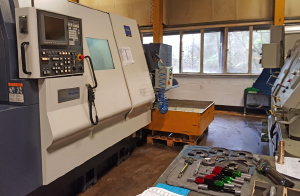
Bar turn-mill centre Miyano BNE-51 MSY installed at MCS in Redditch.
Here, the clean sheet approach by Citizen’s application team was described by Mr Lambert as: “Impressive and a major factor in Citizen winning the order backed by machine build quality and the levels of flexibility available.” He said: “Even finer points were considered such as rationalising tooling, the use of an IEMCA Master 80Up 3m bar feed capable of holding enough bars for a full 12 hour unmanned run, the number of parts achievable per bar, as brass bar ends can work out expensive and the application of coolant and filtration. Very important to us over pure cycle time, was the consistency of the operation and number of parts in the box at the end of the 22 hour production day!” Citizen’s engineers were also able to produce the four demonstration parts using 80 per cent common tools which are all held on the machine to speed change over while helping to optimise spindle utilisation.
Once the machine was selected, Citizen faced a series of staged process capability trials over a four week period attended at different times by setters, operators, and the quality engineer. As Mr Gray explained: “This was not overkill. We are a small company, not a jobbing shop, but we incorporate large business practices as we produced over 4 million components in 2016. As these were primarily to the automotive sector and suppliers to assisted living technology, we also serve other key sectors such as marine, environmental and white goods, which are helping to provide our organic growth. We also have to meet their strict contract standards.
Once accepted and installed at Redditch, further trials were run under normal production conditions to meet a full uninterrupted shift for each of three most complex components. Said Mr Lambert: “We are achieving exceptional performance from the machine enabling us to confidently maintain a consistent standard even when unmanned through the night with cycle times varying between 90 secs and 220 secs.”
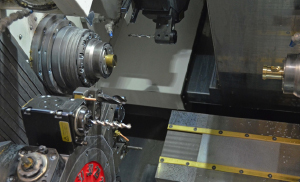
Tooling zone of 12 station all-driven twin turret Miyano BNE-51MSY
As MCS were seeking consistency of production, the eight tonne BNE-51MSY met this need as it is built upon a single heavy slant bed casting with hand-scraped square slideways. These features maximise rigidity, minimise vibration and aid repeatable surface finish and tolerances.
The flexibility of the slant bed configured Miyano, with its two, 12-station all-driven turrets, one with 3-axes of travel, the other with 2-axes available, means it can cut with three tools simultaneously. It has a fixed main spindle with 15 kW drive and a 7.5 kW motor is used on the secondary spindle. Both spindles have a maximum speed of 5,000 revs/min. Both turrets are able to carry multiple tools and service either or both spindles with driven tools powered by 2.2 kW motors having 6,000 revs/min with 25 Nm of torque.
MCS was set up in 1986 by Warren’s father Jim, who is still involved as chairman, as a conventional machine shop with single and multi-spindle autos. It still runs six Wickman multi-spindle machines alongside the CNC machines on extended day shifts producing up to 50,000 parts a week.
The first CNC sliding head machine was installed in the early 90s and since early 2000, MCS has ploughed back into the business some 15 per cent of turnover. In 2016 over £450,000 was invested in machines and a new quality centre. In-house training is part of the ‘quality strategy’ with three apprentices and Courtney Picken, who has just celebrated his 21st birthday after four years of training, has been given the role of trainee setter on the new Miyano.
Said Mr Gray: “From our experience and ongoing investment in equipment, systems and people, everything is now in its place to take us to a new level to develop the business by providing greater levels of account management. This will enable the company to grow and be a key supplier on larger contracts with existing, as well as new customers.”


